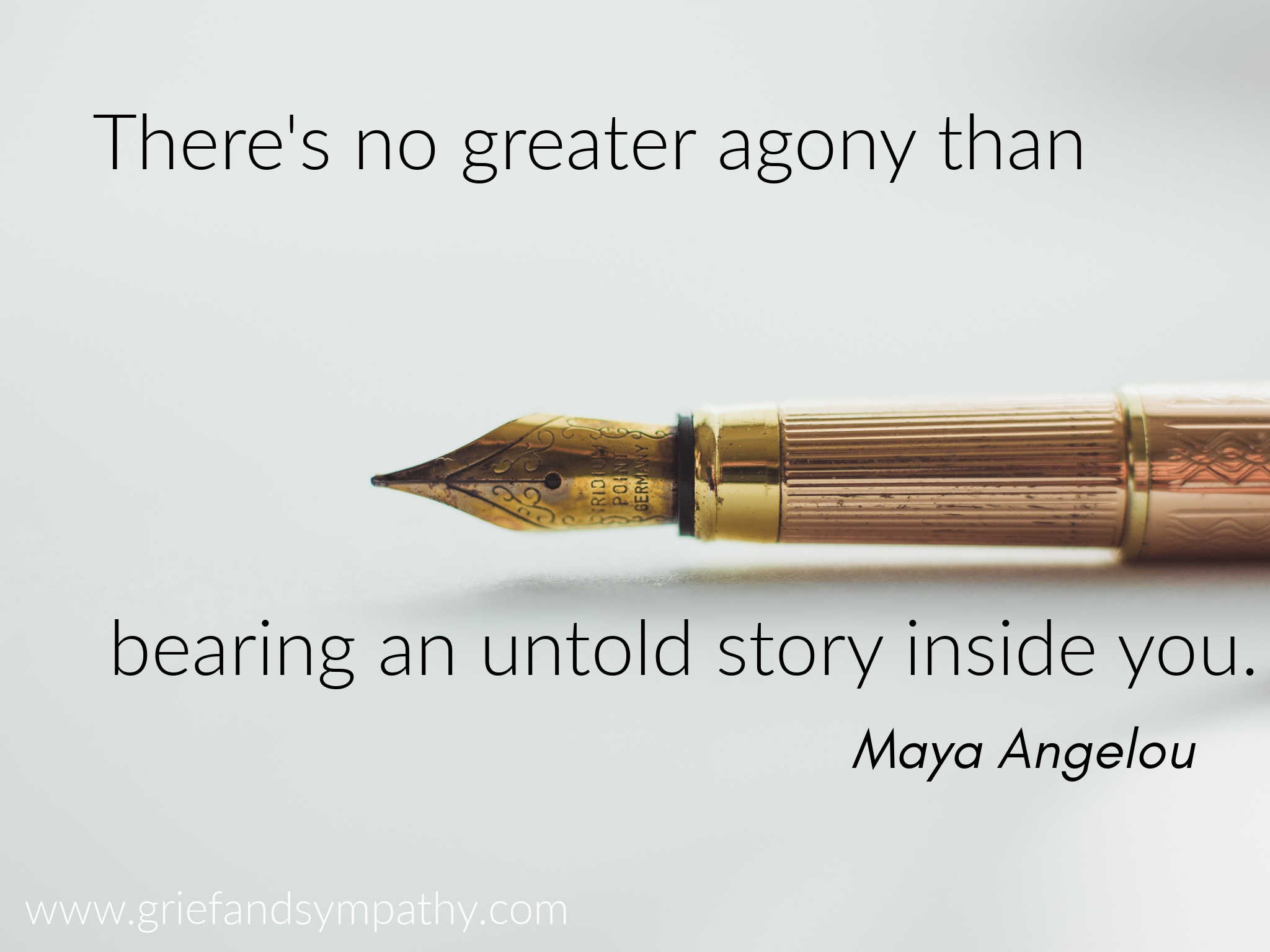Grief Journal Ideas
By Lesley Postle, Editor of GriefandSympathy.com.
Reviewed by Assoc. Attending Psychologist Wendy Lichtenthal.
“Reflective writing can help us make sense of a world that doesn’t.” Lichtenthal and Neimeyer
With the help of grief journaling expert Wendy Lichtenthal, PhD, we have put together a selection of grief journaling ideas which have been shown by Wendy’s research to be the most effective. Working through some of these specific grief journaling methods may help you to find meaning and peace after your loss and guide you through your grief journey.
Wendy explains why using some of these guided methods can work better than just writing randomly here.
Telling the Story
 Original Photo: Art Lasovsky
Original Photo: Art LasovskyNot all of us have an unlimited number of family and friends who are willing to listen to us tell the story of our loss, and it is certainly true that many of us will feel a need to tell our story in order to ‘get it off our chests’ so to speak.
In the early days, we are in a state of shock after a loss. We are often numb, and it is hard to come to terms with what has happened. Going over the story can help it to sink in so that we can process it, and begin to accept the reality of our loss. Writing it all down is a way for us to do this, helping us to process our feelings and create a coherent narrative of what has happened.
The danger is that we can get stuck in this phase and keep on going over and over the most distressing details or ruminating about how it feels like the loss doesn’t make sense or was unfair. This is particularly true if the death was a traumatic one.
While these are natural struggles, what Wendy’s research has suggested is that using writing prompts that help you think about more helpful ways of making sense of your loss or think about the greater significance of your loss experience can be beneficial. This is a process, and it’s not that people have an epiphany and land on a satisfying way of making sense of or meaning in their loss right away. Sometimes we have to “try on explanations” for the loss, see what feels like it fits – at least for now, as how we make meaning of experiences commonly changes over time.
Writing about how you make sense of your loss can help you evaluate different ways of thinking about “why.” It can give you distance from the thoughts swirling around in your mind so that you can examine the way you make meaning of things and create a narrative that fits with your belief system and values.
Journaling can also give you a chance to consider the ways your loss experience has led to important, meaningful, or valued changes in what matters most to you, such as changes in your goals, relationships, stance on life, or values. Wendy’s research has shown that focusing on the significance of the loss in these ways in your writing can be especially helpful, though it is key to point out that this may be very hard to do when your loss has only just happened. This sort of writing exercise may be best suited for those who are a bit farther out from their loss.
Wendy shares that focusing your lens on how you make meaning of your loss and identifying what matters most, that is, your “whys” for continuing on, can serve as lighthouses when you’re feeling adrift in the sea of grief.
Keeping a Diary
Writing a daily diary can be a useful way of monitoring how you are feeling and working out what triggers you. It can also be a way of finding and acknowledging secondary losses that you might not have realised that you have, such as losing common friends, or being unsure of your self-identity now as a husband, wife, mother, father, son, daughter, sister, brother. . . Maybe you’ve lost the person who you went to for help with DIY, or advice on financial matters. If you lost a child, maybe you no longer have contact with their friends, school teachers and other parents.
The Widow411 website even suggests writing down all your secondary losses and sending them in a ‘letter to grief’.
You may find looking back at the diary after a period of time that you can identify the things which you miss most and find ways of dealing with them. Perhaps you can also realise that gradually there are more times when you are coping and feeling better.
Grief researchers Turret and Shear found that identifying those moments and figuring out what you were doing that made you feel better can be helpful. You can then work on increasing the times when you feel better and dealing with the triggers that set you off. (Grief Monitoring Diary, p. 27 in Techniques of Grief Therapy, Ed. Neimeyer, 2012).
You may also notice there are situations that consistently lead to intensified grief. Avoiding those triggers isn’t necessarily the answer, but being aware of them, and mindful of when you might encounter them will help you work out strategies for coping with them. We have written about grief triggers here.
Writing a diary is also useful to find out if you are developing a pattern of skipping meals, drinking too much, or avoiding social events, things which can make you feel worse by affecting your physical or mental health.
Reference: https://www.tandfonline.com/doi/abs/10.1080/07481180500348860
Overcoming ‘Unfinished Business’
Research by Wendy Lichtenthal and her colleagues has shown that feelings of ‘unfinished business’ can make the grieving process harder for many people. Examples of this might be:
- Missed opportunities – “we were going to visit his family in Hawaii”, “he was going to teach me how to make pasta” and so on. . .
- Dreams that remain unfulfilled – “we never got to have children”, “my child never made it to college”. . .
- Unresolved arguments – “I wish she knew I didn’t mean it”
- Not having time to say sorry – “he died before I got the chance to put things right”
- Not having made a confession – “perhaps things could have been different if I had come clean”
- Not having spent enough time with the loved one – “if only I’d made more time away from work to do the things we planned”
- Not having told them you love them – “I wish I’d told her how important she was to me”
- Anything else which was unresolved at the time of the loss
Sometimes this lack of closure can lead to feelings of anger, regret or remorse, or it can make intense feelings of grief last longer than normal.
Grief journaling can be a cathartic way of resolving some of these issues and finding peace. It can help us to re-build bonds with the deceased and change our ongoing relationship with them.
One of the best ways you can do that is by writing letters to the deceased which we’ll talk about below.
Grief Letter Writing
Sometimes referred to as ‘letters to heaven’ by those who are religious, or just ‘unsent letters’ by those who are not, writing to your lost loved one can be a valuable exercise whether you are religious or not.
According to Robert A. Neimeyer, author of ‘Lessons of Loss, A Guide to Coping’, these letters can be a way of reconnecting with a lost loved one and maintaining a sense of connection rather than seeking the ‘closure’ of a relationship, which many naturally do not want to do.
As we have mentioned above, letters can be a way of saying things that we wish we had said when they were still alive, and to ask questions which we still have.
Where do you start, you may ask? We have many grief journal prompts here, but a good way to get started with a letter might be with a couple of these openings:
- What I’d love you to know is . . .
- The things I’ll always treasure about you are. . .
These days, people often use social media to carry on their conversations with a lost loved one by keeping their pages active or starting a new private one for the purpose.
But how do we get answers to our unresolved questions?
Letters to the Living
In her book, Bearing the Unbearable, Joanne Cacciatore tells a story of how she started writing to the daughter she lost when she was still a baby. After pouring her heart out through many, many tears and asking for forgiveness and expressing her eternal love, she found herself writing a response from her child back to her. The reply was full of the forgiveness that she wasn’t ready to grant to herself, and it helped her to realise that her relationship with her lost child was not over, but that it would continue, just in a different form.
Writing back to yourself from your loved one can be a very cathartic experience. It can help you to realise what your loved one would have wanted for you in the future. It can help you to know that the person would have forgiven you and wanted you to be happy.
Some people write to their lost loved one for years after their deaths, telling them all the little details of their lives and writing the responses that they know in their hearts would be forthcoming.
Others may only do it for a short time, or only on anniversaries or birthdays. Whatever works for you, it might be worth giving it a try.
Reference: https://link.springer.com/article/10.1007/s10879-009-9135-3
Apology Letter after a Loss
The apology letter is a more specific form of letter to the deceased and is an effective way of helping to overcome the ‘unfinished business’ to which we referred above. Although we’ve called it an apology letter, it’s good for getting something off your chest which might be causing you to hold on to guilt or regret, you can also use it for telling people things which you didn’t during their lifetime.
This type of letter can be an excellent way of settling matters in your own mind in a way that can bring you peace.
Writing a reply to yourself is a particularly good way of bringing things full circle and coming to an acceptance of things as they are.
Writing in Response to Literature or Poetry
Reading words that ‘mirror’ our own experiences can be a comfort in grief. It helps us to process and understand the emotions we are feeling and to realise that we are not alone, that what we are feeling is ‘normal’. I think that when our emotions are described in language that is expressive and beautiful, it somehow helps us to accept them. It gives our feelings meaning and purpose.
Some of our most popular pages are those with poetry and quotes.
Inspirational quotes about grief and loss
These can be good starting points for journaling. Some of the questions you could ask yourself about what you read can be found on our grief journaling prompts page.
Gratitude Journaling
Gratitude is a practice that I have come back to again and again, and which I learned through my yoga and meditation classes.
In the context of grieving a loved one, it can be very useful in reconnecting you to the happy memories and the good times you shared. Some people may feel guilt in focusing on good feelings and memories, but the one doesn’t cancel out the other. Finding pleasure in happy memories doesn’t mean you are grieving any less, but is a wonderful way of honouring your loved one and keeping a strong bond going with them into your future life.
A simple way of starting a gratitude practice would be to write down 3 things about your loved one for which you are grateful each day. You could write down things you learned from them, things about their character you loved, or about experiences you shared. Re-tell the stories of the special occasions you had or the places you visited and hold them in your heart with gratitude.
Related Pages:
What 20 Years of Grief Journaling Taught Me by Sue McDonald
Journaling through Grief - How it can benefit you
Recommended Read:
This is one of the best guided journals we have come across. Alternatively, check out the lovely journal notebooks at Etsy.

How to Carry What Can't Be Fixed, A Journal for Grief
- Grief and Sympathy Home
- Self-Care
- Grief Journal Ideas
Where to get help:
Have You Considered One-on-One Online Grief Counseling?
Get Expert and Effective Help in the Comfort of Your Own Home
The following information about online counseling is sponsored by 'Betterhelp' but all the opinions are our own. To be upfront, we do receive a commission when you sign up with 'Betterhelp', but we have total faith in their expertise and would never recommend something we didn't completely approve.
Do you feel alone and sad with no support and no idea how to move forward? It can be tough when you are stuck in grief to find the motivation to get the most out of your precious life.
Online counseling can help by giving you that support so you don't feel so alone. You can have someone to talk to anytime you like, a kind and understanding person who will help you to find meaning in life again, to treasure the memories of your loved one without being overwhelmed and to enjoy your activities, family and friends again.
- Simply fill out the online questionnaire and you will be assigned the expert grief counselor most suitable for you. It only takes a few minutes and you don't even have to use your name.
- Pay an affordable FLAT FEE FOR UNLIMITED SESSIONS.
- Contact your counselor whenever you like by chat, messaging, video or phone.
- You can change counselor at any time if you wish.
- Click here to find out more and get started immediately.
- Or read more about how online counseling works here.
Sales from our pages result in a small commission to us which helps us to continue our work supporting the grieving.
Hypnosis for Grief - 10 Ways It Can Help You
Try a gentle hypnotherapy track to relax the mind. Learn how self-hypnosis can help you cope with grief at any time of the day or night.

For Remembrance:
Sales from our pages result in a small commission to us which helps us to continue our work supporting the grieving.
Memorial Jewelry to Honour a Loved One
Check out our lovely range of memorial jewelry for any lost loved one. Pendants, necklaces, rings or bracelets, we have them all in all kinds of styles. Choose for yourself or buy as a sympathy gift.
Create an Online Memorial Website
Honour your loved one with their own memorial website. Share photos, videos, memories and more with your family and friends in a permanent online website. Free for basic plan with no ads.








